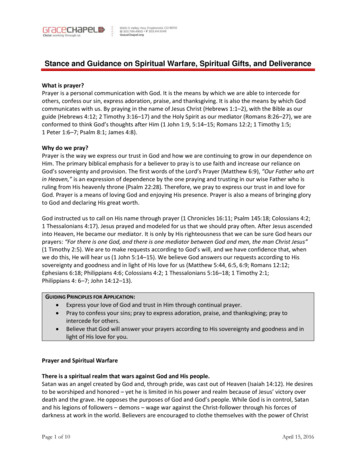
Transcription
The GreaterSpiritual Gifts1 Cor 12:31“Earnestly Desire The Greater Gifts”Book 1 of 3 in The Complete Advanced Bible Study onSpiritual Gifts to Cause Spiritual Growth, by Rick David,an Evangelist and Author of FreeBibleStudy.org
Spiritual Gifts Arefor Causing SpiritualGrowth, Not SensualOne of the biggest challenges we all face in life isdiscovering or finding the things at which we aregood or exceptional, or as some say, “Our God-giventalents”. Then, when we do find or discover thosethings, the second biggest challenge is whether ornot we will use them for what God had intended.Spiritual gifts are for spiritual use, not sensual. Thisis true concerning all of our God-given talents andabilities. They are for spiritual purposes. Are you using your God-given talents for spiritual or sensualpurposes? Do you know all of your God-given abilities? When you complete this Bible Study on TheGreater Spiritual Gifts (as well as the Bible Study onthe Non-Teaching Spiritual Gifts, and the Bible Studyon the Situational Spiritual Gifts), by faith, you willknow the answer to these questions and a whole lotmore. For example, God will help you to understandthe exact meaning and multi-faceted purpose of everydisciple’s life and calling, especially yours.
The GreaterSpiritual Gifts1 Cor 12:31“Earnestly desire the greater gifts”The Complete Advanced Bible Studyon Spiritual Gifts to Cause SpiritualGrowth, A Three Book Series1. The Bible Study on the Greater Spiritual Gifts, “Earnestly Desire the Greater Gifts” (1 Cor 12:31).2. The Bible Study on the Non-Teaching SpiritualGifts, “We Have Gifts That Differ” (Ro 12:6).3. The Bible Study on the Situational Gifts, “EachMan Must Remain in That Condition [situation] inWhich He Was Called” (1 Cor 7:20).
Copyright 2014, Pat “Rick David” Yanello, All Rights ReservedPublished by Rick David. First Edition 2009, Last Edition 2014.Benefits, Goals and Objectives of This Study1. Discover the spiritual gifts which God gave to you.2. Understand how special and distinct your gifts are and how they make you necessary and valuable to other disciples, even to your own family.3. Learn what God is trying to accomplish with your spiritual gifts, the goal in using them.4. Gain a great sense of spirituality in everything that you do in life, especially in whatyou do for disciples and the churches, and in what you want them to do for you.5. Learn to avoid causing sensual growth with your talents and abilities.6. Consider if you can increase your abilities to cause even more spiritual growth in others.7. Consider becoming a teacher, in some fitting way or context.8. Examine your effectiveness in using your talents.9. Stop or reverse the spiritual decline in the Christian church, its decline into thesensuality of the world, by properly using your gifts.10. Learn the difference between the gift, gifts, baptism, and the fruit of the Holy Spirit.11. Discover the three kinds or categories of gifts, the key differences between them,and the range of gifts available within each category.12. Test yourself to see if you have a greater spiritual gift or could receive one, and more.Cover ExplanationSpiritual talents are like gifts wrapped up in a box. They are given to us by someoneelse. Therefore, they are free. They cannot be earned. They cannot be bought. Theyare gifts. They must be opened or unwrapped by the recipient in order to discoverwhat is inside. They must be accepted by the recipient and be put to good use in afitting way. This is the nature of spiritual gifts.Acknowledgements and DedicationThanks be to God, the giver of every good gift. I dedicate it to all of us who love thetruth about spiritual gifts and the holy purpose which they serve.About the AuthorGreetings. My name is Pat “Rick” David Yanello. By God’s grace and power, He has called me to be an evangelist, a husband of one wife, a fatherof nine children (all from that same wife!), a publisher, a home schooling father, and more. I have authored several Bible studies that have been usedby tens of thousands of people worldwide. I am truly blessed by God toestablish FreeBibleStudy.org and FreeBibleSchool.org, and the core curriculum used therein. These websites have had millions of page hits. I was bornand raised in Pennsylvania, but I have also lived in Texas and North Carolina. I have personally served in the spreading of the gospel in many communities throughout the United States, and in Kenya, Tanzania, and Mexico.Rick David callsupon the nameof the Lord in hisdaughter Joelle’sbaptism.August 2011Translation: Unless otherwise noted, all Scripture references from the New American Standard Bible,Copyright, The Lockman Foundation 1960, 1962, 1963, 1968, 1971, 1972, 1973, 1975, 1977, 1995. Usedby permission. Bold, brackets, and underlines made by Patrick David Yanello.
ContentsAdvanced Introduction to Spiritual Gifts 91. The Meaning and Purposeof Spiritual Gifts 92. The Difference Between theGift, Gifts, Baptism, and Fruit ofthe Holy Spirit 193. There Are Three Kinds of Spiritual Gifts 294. The Gift of Leading Souls 35Test on the Greater GiftsSelf-Tests on The Five Greater Gifts 43The Gift of Apostle 45The Gift of Prophet 47The Gift of Pastor 48The Gifts of Evangelism and Teaching 54
The Meaning and Purposeof Spiritual GiftsOn the Purpose of the GiftsWhat is the meaning of life?“But to each one of us grace was givenaccording to the measure of Christ’s gift.Therefore it says, “WHEN HE ASCENDEDON HIGH, HE LED CAPTIVE A HOST OFCAPTIVES, AND HE GAVE GIFTS [spiritualgifts] TO MEN.” (Now this expression, “Heascended,” what does it mean exceptthat He also had descended into thelower parts of the earth? He who descended is Himself also He who ascended far above all the heavens, so that Hemight fill all things.) And He gave someas apostles [a gift], and some as prophets, and some as evangelists, and someas pastors and teachers, for the equipping of the saints for the work of service,to the building up of the body of Christ;until we all attain to the unity of the faith,and of the knowledge of the Son of God,to a mature man, to the measure of thestature which belongs to the fullness ofChrist. As a result, we are no longer to bechildren, tossed here and there by wavesand carried about by every wind of doctrine, by the trickery of men, by craftiness in deceitful scheming; but speaking the truth in love, we are to grow upin all aspects into Him who is the head,even Christ, from whom the whole body,being fitted and held together by whatevery joint supplies, according to theproper working of each individual part,causes the growth of the body for thebuilding up of itself in love. So this I say,and affirm together with the Lord, thatyou walk no longer just as the Gentilesalso walk. they, having become callous,have given themselves over to sensualityfor the practice of every kind of impuritywith greediness” (Ephesians 4:7-17, 19).What is the meaningand purpose of yourown life? The answerto this question is somehow related to yourown talents and abilities. One of the biggestchallenges we all facein life is discovering orfinding the things atwhich we are good orexceptional, or as somesay, “Our God-given talents”. Then, whenwe do find or discover them, the secondbiggest challenge we face is whether or notwe will use them for what God had intended.As you ought to see in this lesson, Spiritualgifts are for spiritual use, not sensual. This istrue concerning all of our God-given talents and abilities. They are for spiritual purposes. Are you using your God-given talentsfor spiritual or sensual purposes? Do youknow the difference between the two? Doyou know all of your God-given abilities?As you carefully study the gifts of the HolySpirit, God Himself will help you to understand, by faith, the exact meaning andmulti-faceted purpose of every gift, andtherefore each disciple’s life, especiallyyour own life. Therefore, you will have amuch better chance to more perfectlyfulfill the whole will of God in your life. Yourlife will have more meaning and purpose.Yet, you will have more good work to do.9
The Gifts Are For SpiritualChurch Growth, Not Sensual1. Every disciple can causespiritual growth in othersThere are several passages in theNew Covenant which relate to spiritual gifts (with spiritual meaning ofGod’s Spirit, His holy nature). However, there is one passage which reveals their overall meaning, purpose,and goal (Eph 4:7-19). Therefore, letus begin with this passage to help usto understand the big picture of whatGod is aiming to do with them. Then,when we do study a specific gift, wewill not get as easily lost in the detailsof it or take it out of its overall context, use, or ultimate purpose in life.For example, “Toeach one of usgrace was given according tothe measure ofChrist’s gift” (Eph4:7). This meansthat Christ measured out to eachdisciple a favor from God in the formof a certain kind or amount of gift, aspiritual gift. So then, since every disciple has been graced with a holy talentfrom God, then, with his gift, every disciple can cause some kind or measureof spiritual growth in other disciples.Consider the contextNow, the subject or context of this passage is how God gave us spiritual giftsto cause spiritual, not sensual churchgrowth. For example, as a result ofusing the “gifts” (Eph 4:8) of God tocause “the growth of the body” (Eph4:16), we then are to “walk no longerjust as the Gentiles also walk. they,having become callous, have giventhemselves over to sensuality for thepractice of every kind of impurity withgreediness” (Eph 4:7-17, 19). Therefore,spiritual gifts are designed to teach ushow to not live in sensuality, which theGentiles crave. For the opposite ofspirituality is sensuality. And, as Jesussaid, “sensuality” (Mk 7:22) is “evil” (Mk7:23) and “defiles the man” (Mk 7:23).Are you beginning to understandand recognize who is spiritual or not?For many inaccurately define what itmeans to be a spiritual person. Next,consider three points from this context.Note: In regards to one’s life and worship of God, to grow in spirituality,not in sensuality, I highly recommend two studies. The Bible Study onNew Life, “Walk in Newness of Life” (Ro 6:3), and The Bible Study on “TrueWorshipers. For Such People the Father Seeks to Be His Worshipers’ (Jn4:23). These studies will help you to carefully examine the different partsof your life and worship to see if they are indeed spiritual or sensual. 10When you find it, don’t bury it!When you discover one you giftsfrom God, you may not want it. Likethe story of the unrighteous servant(Mt 25:14-30), you may be temptedto bury it. He did not use or develophis talent for the benefit of God orother disciples. You might be just asselfish about your own talents as well.Now, there are many reasons whyyou may not want to use your gifts.Perhaps you are not yet skilled in using them or have not yet found anopportunity to do so. Perhaps youare afraid, lazy, or do not like the giftthat you have received from Godor the person or people whom youhave to serve with it. The man whoburied his talent had an unrighteousfear of God and also was lazy (Mt25:24, 25). For this, God held him accountable and condemned him,since it kept him from using andcausing growth with the one andonly talent which God gave to him.
Be a good steward of itPerhaps you are afraid of man.Maybe you do not like the gift thathe gave to you. Perhaps you do notlike the solemn responsibility whichcomes with it or the idea of beingheld accountable for something.You might just be rebellious at heart.But, whatever the sinful excuse, youmust overcome all personal obstacles to become a good steward ofthe spiritual gifts which God gaveto you. So examine yourself. Regarding your talents, do some selfanalysis and act accordingly.Since God gave you a certain gift,not man, He Himself will hold you accountable for using it, not man. So, inthe sight of God (not man, woman, orchild), you must be a good stewardof your gifts and talents and put themto good use in serving others. For example, “As each one has received aspecial gift, employ it in serving oneanother as good stewards of themanifold grace of God” (1 Pe 4:10).So, Peter confirmed that each disciple has a “special gift,” but also thateach disciple must “employ it”. It doesnot work on its own. One must put it towork, as a good steward would do,whether he is paid for his work or not.Consider the range of giftsWhen I consider the three categories or kinds of gifts (the greatergifts, meaning the teaching gifts,the non-teaching gifts, and the situational gifts), when I consider thewhole range of talents which Godgives, I can see how men will betempted to bury their talents.For example, at one time, Jonahrefused to use his preaching andteaching gift (a greater gift) to helppeople repent and be saved fromGod’s judgment. Both the priest andthe Levite refused to exercise the giftof mercy (meaning compassion, anon-teaching gift) on the man whowas robbed and left beaten andbleeding. Consider the son who decided to “cash out” of his father’shouse, somehow taking an early inheritance, for his father was not yetdead. Then he went out from hisfather and wasted it on loose living, including sexual immorality (Lk15:13, 30). And so we can see thateven with one of the situationalgifts, such as the gift of being a son,it can be buried for some sinful reason. What about parents, husbands,wives, daughters, mothers or fathers?Your gift is “special” and unique11Among men, your gift is special andunique. Therefore, among men, including your own family, you yourself arespecial and unique. How many fathersdoes a son or daughter have? Does acountry have more than one king? Howmany mothers does one child have?Can a mother be a father? Can a fatherbe a mother? How many sons or daughters does a parent have? Can a son behis own father? Can a disciple be hisown teacher? How many people wouldbe willing to show compassion on youin your time of need? How man peoplehave taught you the word of God, andthat very accurately and thoroughly?How many evangelists have taught youabout the three kinds or categories ofgifts? Are you beginning to see how special are the gifts of God? I can see it. Andwhen I remind myself of this, in the midstof my own challenging callings andgiftings, such as in my own family andamong my own relatives, and in my ownchurch, or worldwide ministry, it givesme renewed and refreshed purpose.
Now, since Peter said, “Each onehas received a special gift” (1 Pe4:10), this means that it is unique ordifferent from what most other disciples have received, especially inone’s own family. Each family member is so very special and unique tohis family. This “special” nature ofthe “special gift” you have makesyou more needed, valuable, andrespectable to other disciples orfamily members, though they maynot even honor you much for it.2. Some disciples can cause alot of spiritual growth in othersBut, what if you were not there withthem? You see, you can contributeto their lives in a way in which theythemselves cannot even contribute.Can a son be his own father? No oneelse can be you. This is the uniquenature of your gift and valuablenature of your own life. Contrary towhat some think, or what your family thinks of you, or what your churchthinks of you, no one else can replace you; no one. This is by God’sgood design. For example, “Eachone is given the manifestation of theSpirit for the common good” (1 Cor12:7). So, God gave you a talent,not for your individual good, but forthe “common good” of other disciples, especially your own family.Remember, every disciple is calledto attend church with a purpose toserve others, not only themselves(SEE He 10:24, 25). For he is to consider how to use his talent in sucha way as to increase the love andgood work of every disciple, including the love and good work of hisown family, and if possible, eventhe love and good work of mankind. Therefore, we need to consider how to use our talents for thebenefit of others. This is providing.This is providential.Even though every disciple cancause spiritual growth in others,since all disciples have spiritual gifts,some gifts can cause more spiritualgrowth than others. So, the edification power of the gifts, if you will, isnot exactly the same.For example, the teaching giftshave the potential to cause a lotof spiritual growth in disciples. Thereason for this is that the teachinggifts were designed by God andgiven to men to specifically impartthe will and word of God to men.It is their specialty. It is what makesthem unique and different from allof the other gifts. For example, below, consider the five teaching gifts.The five teaching gifts12“When He ascended on high. Hegave gifts to men. And He gavesome as apostles [a gift], and someas prophets, and some as evangelists, and some as pastors andteachers for speaking the truthin love, we are to grow up in allaspects into Him who is the head,even Christ” (Eph 4:8, 11, 15).
So, in the context of the gifts whichGod gave to men, he singled outand listed five of them which are forhelping people “to grow up” spiritually through “speaking the truth,”meaning through teaching. Now,the five teaching gifts can also becalled “the greater gifts” (1 Cor12:31). The reason for this is that theyhave the greatest or largest potential to edify and grow up all disciples.This is why God said, “Earnestly desire the greater gifts” (1 Cor 12:31).They are greater in their ability edifydisciples. This is why I myself call theteaching gifts the greater gifts. Thisis why I wrote this Bible study bookabout them, to inform you of themand to educate you on them. Thenyou can evaluate whether or notyou yourself should: “Earnestly desire the greater gifts” (1 Cor 12:31),meaning one of the teaching gifts.bearers. The apostles have causedthe most growth, and still do todaysince their words are written down inthe New Testament for us to read andto learn, and thereby grow spiritually.The prophets of Christ received directrevelation from God, audibly, for theyheard God’s voice. They were forthtelling to the disciples the direct revelation and will of God from heaven,like John did, as written down in thebook of Revelation. In this way, theytaught the disciples. So, the apostles were also prophets of Christ, aswell as evangelists, and teachers.Yet, several of the books of the NewCovenant were written by prophets who were just that, prophets, notapostles. So, today, these prophets are still causing a lot of growth.Evangelists are teachers who goaround from person to person, cityto city, church to church, family tofamily, proclaiming the Christ and Histeachings to them, to all, if possible.Timothy was called to do the work orexercise the gift of “evangelist” (2 Tim4:5). And so Paul sent him around tothe different churches to spread theteachings of Christ, and he also accompanied Paul on certain journeysor was with him in certain locations.So, the unique and valuable specialtyor strength of the gift of evangelist ishis ability to spread the will of God allaround, in the world and also in andamong many groups of disciples orchurches. It is the work which God sentthem out to do. It is the work whichthe Father sent Christ to do and Hisapostles, for they were evangelistic,going from town to town, preaching.Consider their unique specialtiesNow, God only “gave some” members these kinds of teaching gifts“for speaking the truth”. So, onlysome disciples will be able to haveor receive these special gifts. Indeed, as you should see in the selftest for the gift of apostle, some giftsare very, very exclusive in nature. Forexample, there was only one Moses.Likewise, there were only a certainamount of true apostles of Christ.Now, the five teaching gifts (apostle, prophet, evangelist, pastor, andteacher) are all different gifts withdifferent responsibilities. Yet, they allhave one thing in common. Theyall teach. For example, the apostleswere teachers. Yet, like Moses andJesus, they were also covenant bearers. So, in addition to teaching, theirrare specialty was to be covenant13Pastors are called by God to teachone flock of disciples, meaning onechurch. The word pastor means shep-
herd. And so, a shepherd cares for onechurch like a shepherd cares for oneflock of sheep. They are like fathers tothe whole family of a church. Indeed,as you will see in the pastor gift selftest, there are a lot of qualificationsin the Scriptures one must satisfy tobe called by God to pastor a church,even the requirement to be a fatherwith believing children. and Peter wasalso a pastor, a shepherd among thedisciples in Jerusalem (SEE 1 Pe 5:1-5).Finally, there are teachers who donot have any of the aforementionedsub-specialties, if you will. They simply teach, without the responsibilityto be covenant bearers, without theresponsibility to receive direct revelation of the will of God, without theresponsibility to spread Christ’s truthsin other churches or cities or families,and without the responsibility to ruleover a flock. Yet, they are still teachers, but not pastors, not evangelists,not apostles, and not prophets.For what mother should not teachher children about the gospel of Jesus Christ? What father should bury orneglect his calling and gift from Godto personally teach his own childrenabout Jesus (SEE Eph 6:4)? Do youwish to bear witness to your newestacquaintance about the good newswhich is found only in the name ofJesus Christ? If you have the abilityto speak at all, if you are not mute,do you wish you could gain the courageous ability and confidence tospeak the words and commandments of Christ to others? How will others know what Christ expects of men,all men, both kings and servants, richmen and poor men, young men andold men, saved men and unsavedmen, good men and evil men?It is a matter of becoming amature ChristianIndeed, the Scriptures say that atsome point in our Christian walk,and in some fitting way, we shouldall become teachers (SEE He 5:12).It is a matter of maturity or maturing in Christ. Yet, on the other hand,it is written that not many disciplesshould become teachers (Ja 3:1, 2),since it says we all stumble in whatwe say. And that if we do teachamong disciples, in the church, inthe assemblies, at the judgment,God will be very strict with us as compared to disciples who do not havethis gift or use it among disciples.Earnestly desire the ability toteach othersNow, since God said to: “Earnestly desire the greater gifts” (1 Cor12:31), one has to start evaluating his teaching ability. You mustconsider your desire to teach. Is itgreat? If not, what should you do?How should you do it? Good news!This is why I wrote this Bible studybook about the teaching gifts, toinform you about them. You canuse it to carefully evaluate yourselfand your desire and ability to teachthe gospel. So that you can takea serious, extensive, and detailedlook into this matter, I have included in this study self evaluation testsfor each of the five teaching gifts.14Now, this stumbling of speech, whichJames talks about, does not at allmean a kind of mumbling or beingslow of speech, like Moses was. ForMoses was a great teacher of thewords of the Lord. This is talking aboutmaking mistakes, knowingly or ignorantly sinning in what we are telling
others about the word of the LordJesus Christ. It means bearing falsewitness about Him in some key andessential aspect or written commandment. Yet, a teaching gift can causethe most spiritual growth in others. Willyou risk it? Can you risk it? Should yourisk it? It all depends on how entirelytruthful you are towards the nameand words of Jesus Christ. Do you wantto cause the most spiritual growth inothers? Only some gifts can do this.their gifts to cause growth which issensual in nature. This is not healthy,because it is not holy, meaning sacred, or spiritual.Therefore, Examine your abilityto work properly (effectively)Are you working? Is your part working? Are you playing your part?How are you causing spiritualgrowth in disciples with your gift?Are you purposelyandintentionallylooking to causeholy growth in certain disciples withyour talent? Whatkind of growth areyou causing amongdisciples, or evenamong your ownfamily or relatives? Isit sensual or spiritual,holy or unholy, sacred or secular?3. All disciplesmust work properly to causespiritual growthin each otherJust because everydisciple has a spiritualgift, and therefore cancause spiritual churchgrowth, this does notmean that every disciple is properly working to do so. Spiritualgrowth requires work. Now, usually,people will not grow in the spirit, unless someone, with his spiritual gift, isin some way, knowingly or not, trying to cause them to grow. For Godhas designed it to be this way.For example, “the proper workingof each individual part [a discipleand his gift], causes the growth ofthe body” (Eph 4:16), not the partswhich are improperly working or failing to work at all. Broken , disjointed, or missing parts (disciples andtheir gifts) can stop or significantlyslow the movement of any bodytoward good growth. Even more,not all growth is good growth. Forexample, some disciples are usingWe must encourage proper participation to cause spiritual growth,because only “the proper [i.e. effective/successful] working of eachindividual part, causes the growthof the body” (Eph 4:16). Obviously,broken or missing parts or memberscan stop or significantly slow themovement of any body towardgood growth. Therefore, each disciple must understand the differencebetween how to work properly andimproperly, effectively and ineffectively, successfully and unsuccessfully with his gift in order to causethe church to grow vs. decline insome spiritual or sensual way.15
Encourage member participation so we can growknow what those two purposes are? Doyou know that you are to seek first thekingdom (the assembly), not financialgain (Mt 6:25-34)? Is your job getting inthe way of worshiping and serving God?Unless we get members to properlyuse their gifts, we will decline intosensuality, the opposite of God’sgoal for us (spirituality). We will staylike or become more and more likethe world, which craves all kinds ofsensuality (Eph 4:19). We need spiritual gifts, and members who usethem, to makeus grow in spirit,not in flesh!In the Appendix, there are more questions and encouragement on attendance and other challenges to our growth.2. Evaluate Your DiligenceYour diligence affects a church’s spiritualgrowth. So, are you working very hard withyour gift. Are youexhausting yourselfwith it? On the otherhand, are you taking it easy with yourtalent. Do you rarelybecome weary in using it? Do you knowthat the precious possession of a man isdiligence (Pr 12:27)?Do you know that it isa woeful sin to be atease in God’s house (Amos 6:1), meaning lazy or leisurely? Are you taking iteasy? Are you at your leisure among us?So, let us focuson and encourage memberparticipation tohelp us increasespiritual growth.Yet, we knowthat there are avariety of member participation challenges that wemust face in order to more perfectlygrow in the spirit as a church.Below, consider an excerpt from theAppendix on Encouraging HealthyParticipation and Growth. Let uswholeheartedly face these challengesso that we can encourage the kind ofparticipation among disciples that willcause the most and the best growth.3. Evaluate Your Maturity1. Evaluate Your AttendanceYour attendance affects a church’sspiritual growth. So, are you in the habitof missing church? Why are you in thehabit of missing assemblies? Instead ofattending church, what are you in thehabit of doing? Do you know that it is asin to be missing church (SEE He 10:24,25)? Do you know that disciples arecommanded to be in the habit of attending church with a purpose? Do you16Your maturity affects the spiritual growthof a church. So, are you taking the necessary steps to become mature? Areyou an infant, a child, or a new convert?When is the right time for you to beginlearning about your spiritual gifts and tostart using them? Do you know that theseed sown on thorny ground representsdisciples who continue to go to church,and have some good attendance andparticipation records, but are too worriedabout their lives and their own pleasureto the point that they can bring no fruit tomaturity (Lk 8:14)? Are you at all worriedabout your life? Are you at all seekingpleasure? Today, what are you first seeking? Will it help you to grow spiritually?
4. Evaluate Your Sinsperfectly if you are out of joint in a bigor greater way or gift. Likewise, whenyou complete the Bible Study on theNon-Teaching Gifts and SituationalGifts, you will know if you are out ofjoint in any of those callings as well.Our sins will affect our spiritual growth.So, what kinds of sin are you still in thehabit of committing? Are they logs orspecks (Mt 7:3-5)? Do you understandthe key difference between the two?Do you know that if you are carryingaround a log of sin, you should not beteaching or judging disciples (Ro 2),or in attendance in church, especiallyduring the Lord’s supper, when weeat together (1 Cor 5:11-13)?6. Evaluate Your PartialityWhat you favor will affect our growth,for better or for worse. So, evaluateyour affections. Do you know that favoritism is a sin (Ja 2:9). To what are youpartial? Is it to what God is partial? Doyou know that God’s favoritism (calledgrace) is not the sin of partiality? Doyou know the difference betweenthe partiality (favoritism) of men andthe grace (favoritism) of God? Doyou know what God favors (graces)and what He wraths (does not favor)?Do you know that carrying arounda log of sin among disciples causesbad, sensual, and evil growth (1 Cor5:6)? Do you know that a disciplewith a log of sin is a hypocrite? Whatare the logs of sin which we must immediately remove from our lives andchurch (Re 21:8; 1 Cor 5:11-13)? Doyou know that these sins are not amatter of maturity, but of salvation?Do you realize how many ways di
The Complete Advanced Bible Study on Spiritual Gifts to Cause Spiritual Growth, A Three Book Series 1. The Bible Study on the Greater Spiritual Gifts, “Ear - nestly Desire the Greater Gifts” (1 Cor 12:31). 2. The Bible










